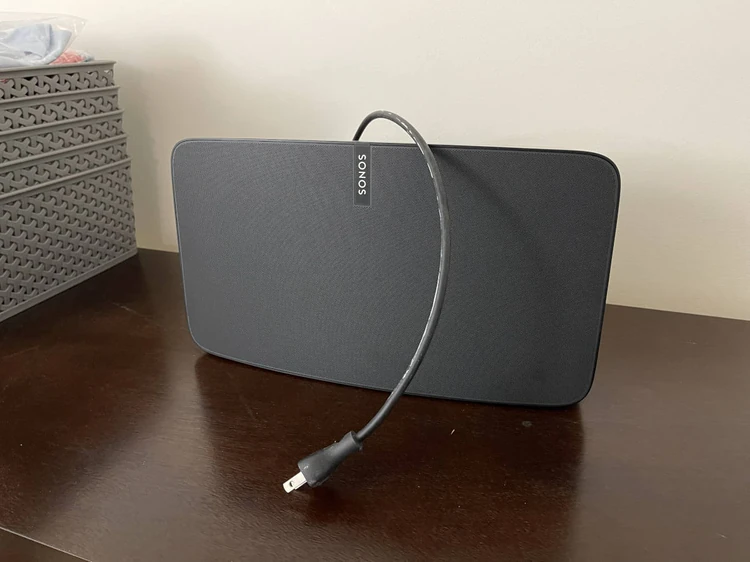The popular, pricey wireless speakers could be bricked if the company falters

It's never a good idea to pay big bucks for a closed-end system. No, we're not talking (this time anyway) about Apple's precious little walled gardens, we're talking about Sonos, the palindromic company that sells high-end wireless speakers.
The company laid off 100 employeeslast week and the CEO issued a statement saying that hisfirst priority is fixing an app update that has been annoying users, who said it's buggy and unpredictable.
Speaking as a Sonos owner, I can confirm that the speakers are difficult to set up and manage and I haven't even installed the update. (I also have a competing BlueSoundsystem, and it, too, is tricky to manage).
If you're not familiar with Sonos, it manufactures speakers, headphones, TV soundbars and other gadgetsthat sound pretty good, if a little bottom-heavy.Their big advantage is that they're wireless -- you don't have to annoy your spouse or partner by stringing wires everywhere and you can avoid drilling holes in the wall.
The drawback, besides the price, is that they're proprietary: Sonos speakers work with other Sonos gear and that's it. If you decide to dump Sonos, you have a collection of heavy boxes that used to be speakers.
What's good about these things is that they set up a subnet on your wi-fi, so they'll work anywhere your wi-fi does. Getting this all arranged and keeping it working through power failures and other unexpected little treats isn't easyin my experience and I'm pretty handy with this kind of stuff.
The current trouble started with what Sonos calls the S2 app, which lets you control your speakers through a mobile app on your phone. Users have said anupdate to S2 made their systems slow andunpredictable and also bollixed up access to their personalmusic libraries.
What's a music lover to do?
The most obvious course of action is to wait and hope things get better. Another is to start planning what to do if they don't. Here are a few options we've tested:
Bluetooth Most serious music lovers will tell you Bluetooth is not truly high-definition and doesn't cover a verylarge area. OK, but it also doesn't cost hundreds of dollars. We have several little bluMe HD units from a company called Auris. Their technology delivers better sound than most Bluetooth receivers and they cost only about $100. You still need powered speakers, headphones or an amp and some speakers but I've found Auris to work pretty well in a 3,000-square-foot house.
And yes, the Auris software is proprietary but if it blows a gasket, you still have your speakers that you can use with another wireless or wired system.
BluesoundSimilar to Sonos, Bluesound will sell you powered speakers, headphones and so forth. They're also temperamental and expensive (as in $500 or so) and only compatible with Bluesound components. Some engineers think Bluesound is superior to Sonos. I personally find the sound to be more neutral, which is the idea behind high-def. Want more bass? Crank it up on your amp or in the Bluesound app.
AmazonWe all know about Amazon's "smart" speakers. They're smart enough, I guess,but high-def they're not. We have a few scattered around the house for days when Bluesound and/or Sonos aren't working but the sound leaves a lot to be desired. Likewise for Google's speakers, which sound like they were ripped out of a 1960 Ford.
There are quite a few other systems out there. Some, like Denon, offer similar closed systems that will also work with Apple Airplay and similar apps. You can spend $1,299 for a Naim system or $23 for a somewhat genericBluetooth adapter from Amazon.
Do you get what you pay for? It's hard to say. High-end sound systems are like very expensive European cars; they're the bestbut getting high-end support isn't always easy and they are often just as finicky, if not more so, than a cheaper system.
Our advice? Get a really good system in the room where you listen seriously to music and be prepared to put up with something a bit less awesome elsewhere in your domicile. Or string a few wires to get to nearby rooms. It's too early in the wireless audio game to put your trust in a single company, so it's probably better to tread lightly for another year or two while things settle down.
Want a second opinion?Crutchfield.com is an online audio store that stocks a wide range of products and actually gives good advice both on its websiteand by phone.
A final word about Bluetooth
A common complaint about Bluetooth is that when you run it through your phone or computer, it silences music for phone calls, alerts,etc. Also, it doesn't work if you drive off and leave your family, roommates, whatever with no music.
A simple solution: Look around for an old laptop or desktop computer that you're not using anymore. Delete just about everything except a web browser and whatever app or setting works with Bluetooth. You can set the computer to play whatever music you want without being interrupted by phone calls about your extended warranty.
Think your old computer is too weakened by age to handle it? This is a good time to discover Linux and escape from the Apple/Microsoft duopoly. Linux is free, open source and most versions will run on anything you can manage to plug in and turn on.
Photo Credit: Consumer Affairs News Department Images
Posted: 2024-08-19 13:26:20



















